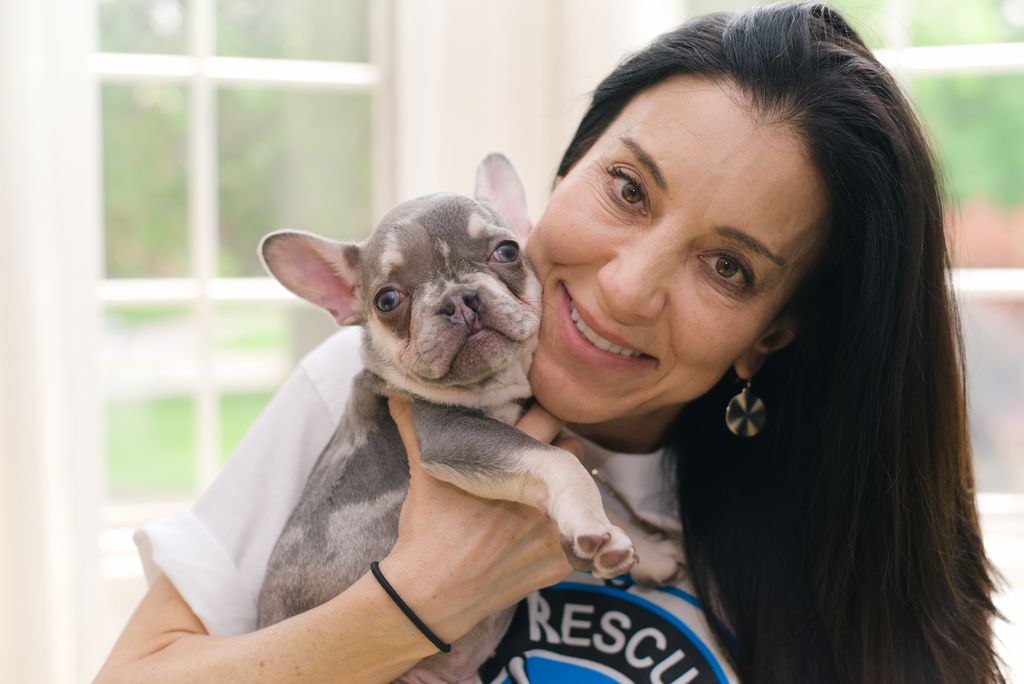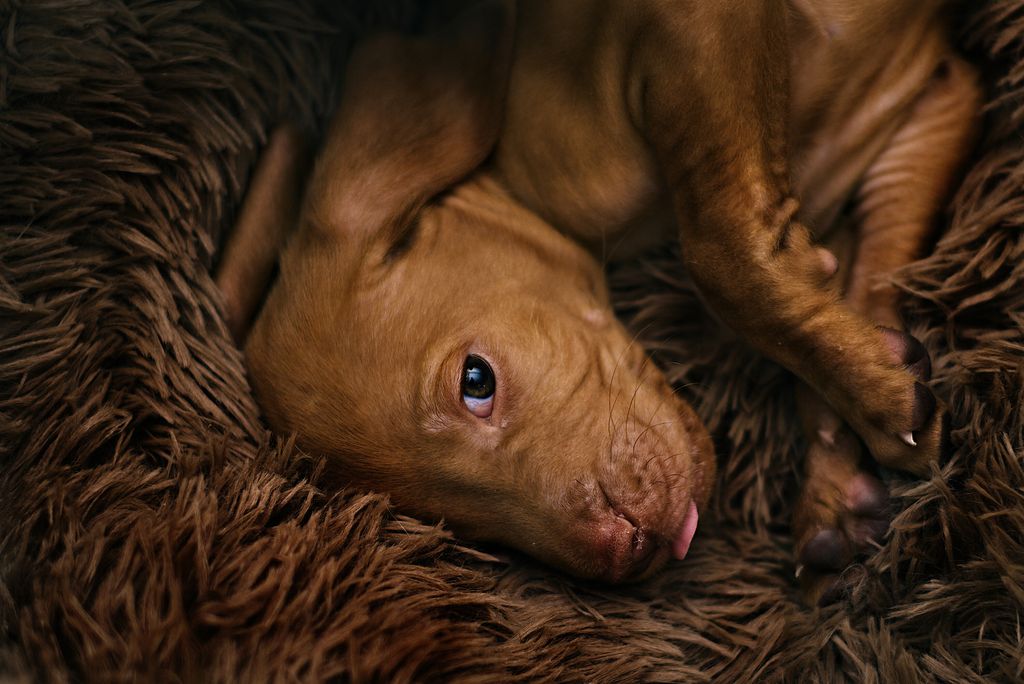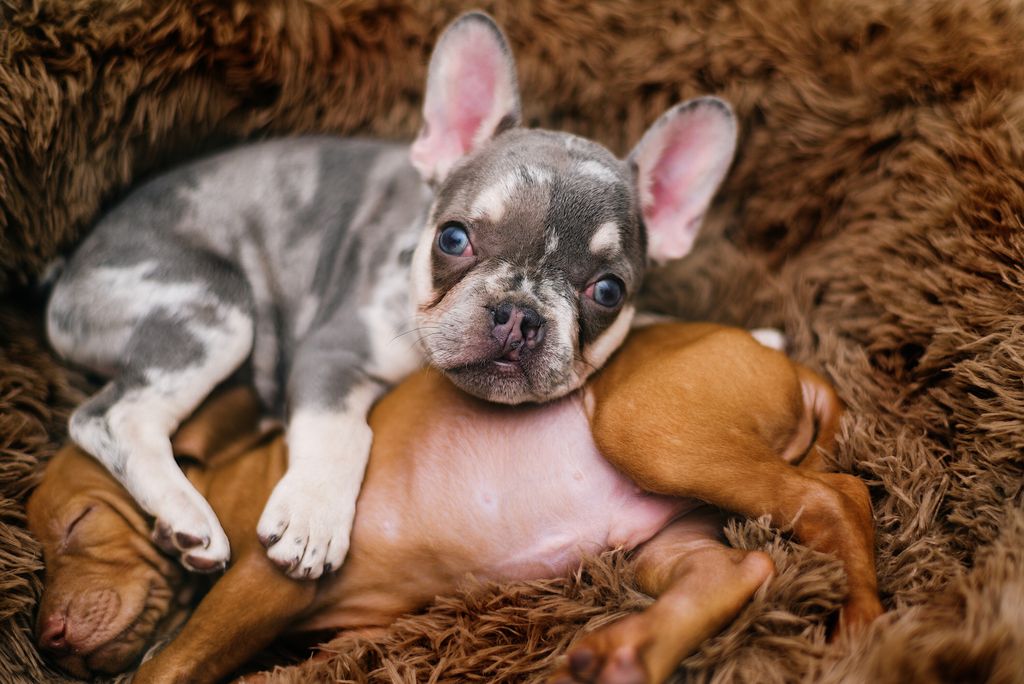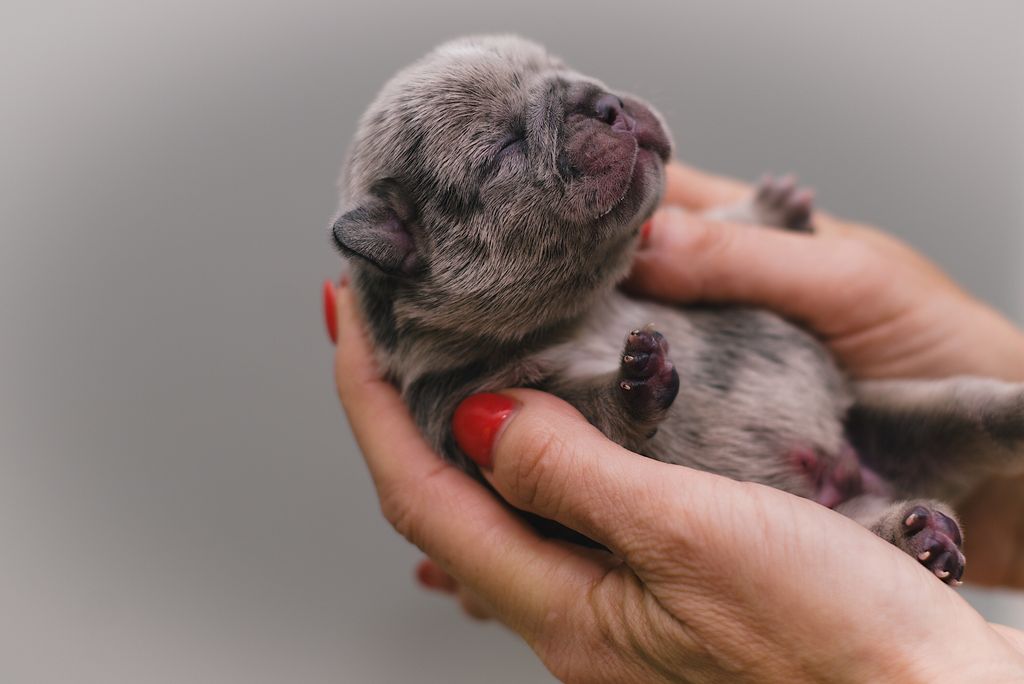
Lindsay Weisman, founder of Cleft Rescue Unit (CRU), has always been passionate about animals. Born with a heart condition herself, she grew up with a soft spot for the medically vulnerable. She would go outdoors with her sister and collect anything that was hurt. “If there was a duck with a broken foot, I would bring it into my house,” Weisman recalls. “I was literally like ‘you be my baby; you be my baby.’” When she decided to become a foster, her family had doubts that she would be able to let them go. Her husband told her, “You’re going to end up with all the dogs!” But the joy that accompanied finding the perfect home for each puppy led her to a bigger mission.
It all started with a puppy named Wrigley, Weisman’s first foster, a French bulldog born with a cleft lip. She fell in love with Wrigley as she tube fed him every three hours for the first four weeks of his life and had no intentions of ever letting him go. Weisman says, “I’d never had a puppy since day one, and I got so attached.” Then a friend reached out to inquire about adopting Wrigley for her son Jack who was born with a bilateral cleft lip and palate and longed for a puppy “just like him.” Once Jack met Wrigley, everyone was in tears, and Weisman knew they were meant for each other.
From then on, Weisman made it her mission to rescue and find homes for cleft-affected puppies. Whenever possible, she strives to match them with families who have children with cleft lips and palates. A large part of that mission includes educating communities about the high success rate of medically fragile pups and their ability to live a long and fulfilling life given the proper care. Puppies born with cleft lips and palates struggle to nurse safely on their mothers, due to the opening that can run all the way from the lip to the back portion of the roof of the mouth.
Cranial facial surgeons Dr. Clint Morrison and Dr. Sara Neimanis invited Weisman and her puppies to their University of Rochester cranial facial camp in 2023. A huge success, kids were lining up to play with the puppies that looked like them. Word spread about the Cleft Rescue Unit and the invitations came pouring in. Monroe Carell Jr. Children’s Hospital at Vanderbilt flew Weisman and her puppies out to Nashville to attend a family day for craniofacial patients. Her pups attended the Smile Train Gala in New York City, a celebration of twenty-five years and two million life-changing cleft surgeries on children around the world.
When The Washington Post ran an article on Weisman, it caught the eye of producers from the Kelly Clarkson Show which led to a segment on the show where Clarkson reunited Weisman with ten-year-old Kynlee and her dog Tennessee. The whole audience was in tears when Kynlee, who was born with a cleft palate, thanked Weisman for saving her pup. “The whole thing was just magical,” says Weisman. “I loved all of it. I will keep sharing our mission forever and ever.”


Celebrities and invitations aside, this work is not all glitz and glamour. Weisman admits that the day to day is absolutely the opposite of fabulous, from the constant clean up detail and puppies running around to managing all the transport. Transportation is an integral part of Cleft Rescue Unit’s operation. Calls come in from all over the Northeast and this incredible team drops everything to get a newborn puppy to Rochester as quickly as possible.
Many of the puppies come from Ohio as the CRU has made connections there with local vets and pet clinics that are located near a significant number of puppy mills. Ninety-nine percent of her rescues are French bulldogs. Frenchies along with pugs, English bulldogs, and Boston Terriers are all brachycephalic or flat-faced with shorter facial bones and muzzles. These breeds often require a c-section at birth. Cleft puppies born at home are less likely to survive, but those born at a clinic can be auto-surrendered.
These calls come in weekly and when they do, Weisman has to act fast. “I scramble to find a foster in Ohio and get our drivers to get the puppies here, and then I have fosters here that really are the most incredible team ever, and I couldn’t do it without them.” She relies on these volunteers to each drive one leg of the journey until the puppy is safely delivered and can be cared for properly, giving them a better chance to grow up and live happy, healthy lives.
Volunteer Cory Naugle describes Weisman as fun and full of love; the heart of the Cleft Rescue Unit. “She has more energy in her pinky than most people have in their whole bodies.” Naugle has accompanied Weisman on many adventures, including that first trip to an Ohio swap meet. “We went to connect with the dog community there and get our name out. We came home with fourteen dogs who were surrendered to us!”
They made so many connections in Ohio that they started a weekly transport from the Rochester area to Ohio and back, picking up puppies that breeders were unwilling or unable to care for. “We do a really good job of ensuring that they have the right families, ensuring they have the right vet care, ensuring that they can grow and be healthy,” says Weisman.
Weisman has a nursery off her kitchen with a giant “wall of fame,” showcasing beautiful photographs of her former foster pups in frames. There is an incubator holding sleeping newborns, a refrigerator full of medicines, and cabinets stocked with supplies. Water bottles are everywhere as dogs with cleft palates don’t drink well out of the bowl. There is another nursery upstairs, off her bedroom, for nighttime feedings. The newborns need to be tube fed every two to four hours depending on their size.
This is more than a full-time job for Weisman. “It’s more like a 24/7 job,” she says. “I was a teacher before I ended up having my kids and then a stay-at-home mom. I might have gone into something that I could do part-time and actually get paid, but I found this passion.”


Before the Cleft Rescue Unit was a formal organization, Dr. Clint Morrison was already working with veterinary partners once or twice a year to help with canine cleft repairs. When Sara Neimanis started working at Strong, she was eager to get involved. “Lindsay and the volunteers at CRU are incredible! These aren’t just animals to them, they are beloved family members,” says Neimanis. “Seeing these kids interact with the puppies who have a relatable feature, and are celebrated for it, is the best. Differences are beautiful!”
One memorable puppy patient for Neimanis is Sammy the yellow lab. She took plastic surgery resident James Butterfield with her to repair puppy clefts and one-month-old Sammy was in the office for a cleft visit. Butterfield fell in love and adopted Sammy. They fixed her cleft a few months later. Neimanis believes that puppies (and humans) with clefts are worthy of love and a good home. She plans to adopt a puppy from CRU in the future.
Taking care of medically fragile pups is rewarding, but the emotional toll of losing a puppy can be almost too much to bear for Weisman. “It happens all the time,” she says. “I don’t often talk about it, but that’s the hardest part for my heart. Those are the little ones that stick in your head that you can’t do anything about.” But watching the healthy puppies grow and become a part of someone else’s family is what keeps Weisman going.
One of her favorite memories is her trip to meet the Urbay family. Elsie Urbay adopted Leo, a cocker spaniel with a cleft lip, for her son Randy who was born with a craniofacial condition that impairs his ability to get a job. Randy and Leo recently graduated from therapy dog training and now brighten the lives of everyone at the Joe DiMaggio Children’s Hospital in Florida. “They are making the world a better place,” says Weisman.
Not everyone has the time and space to adopt a pet requiring special care and Weisman is very particular about where she places her foster pups. “Our puppies always come first,” she says. “It has to be the right fit for them.” She can’t say enough fantastic things about her team of fosters that make this all possible. Volunteers are always needed, from foster families to drivers.
As a nonprofit, CRU is only able to exist because of donations, specifically pet supplies, dog food, and monetary contributions. “We had a little girl who is cleft-affected who raised 600 dollars by making buttons for the rescue,” says Weisman. Donations go a long way as the only money that comes in is through nominal adoption fees. Weisman is also currently searching for a volunteer to help run social media for the rescue.
And this is one social media account you are going to want to follow immediately. Weisman posts photos and videos of all her newborn pups on Facebook and Instagram, encouraging her followers to help name them. Watching these sweet kids and dogs finding each other will have you asking, “Who rescued who?”
Facebook: Cleft Rescue Unit
Instagram: @crurescue
Views: 0




